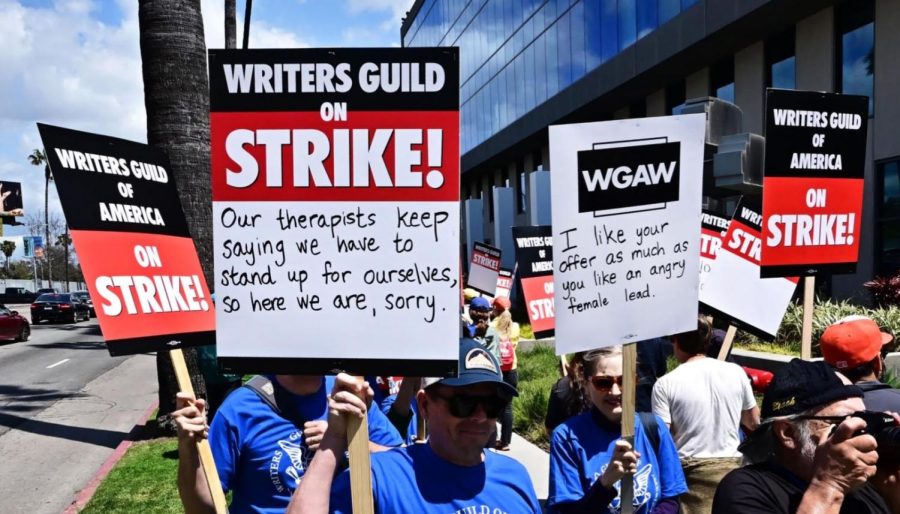The writers strikes and what it means for the entertainment industry
May 10, 2023
People around the world have expressed their confusion as to why the Writer Guild of America (WGA) is currently on strike. After all, don’t TV and film writers get paid enormous amounts of money and live lavish lifestyles? What could they possibly have to complain about?
Being a writer is actually similar to any job around the world. Writers are people that wake up every day, with demanding schedules and expectations, like everyone else. And like many other jobs around the world, it’s getting tougher and tougher to make a living.
Beginning a couple of days ago thousands of writers, actors, and even regular citizens have joined together in support of the WGA strike. These protesters have been chanting and holding signs outside of production studios in California and New York.
Though this protest is serious, the writer’s signs have been quite hilarious. For example, “Chat GPT does not have childhood trauma” and “PAY US! Or I will climb the WB tower and release the Animaniacs.” For more look at the image above.
What’s The Real Issue?
People assume that writers are paid well and live comfortably. This may be true for some, but the majority of writers are still struggling from paycheck to paycheck.
Similarly to the writers, many actors, directors, and other positions in the entertainment, are getting paid far less in residuals than other A-list names. Residuals are payments that are made every quarter by the companies to the writers for the content they produce. On TV residuals pay writers for each re-airing of their work but, with streaming services the game has changed. People can now watch their favorite shows over and over again, but writers are typically only paid for that initial viewing.
According to TV writer Danny Tolli, usually the costs sit around $20,000 for an episode on TV but now it’s almost $23 for streaming.
As previously mentioned, when a show is put on a streaming service (Netflix, Hulu, Prime Video, etc.) the streamers have to pay the writers. The writers only see a fraction of the amount that the streaming service has gained from the show. In some cases, once the streaming service decides it doesn’t want to pay writers’ residuals anymore, they remove the show from the service. This happens a lot, so if you ever wonder why you can’t find your favorite show anymore this is likely the reason.
Is This New?
The last WGA strike went on from 2009-08, where writers were on strike for 100 days and Hollywood definitely felt it. This previous strike is similar to the current one. Protesters were looking for a new contract for what was then called “new media”. Internet streaming had just started, and writers were trying to renegotiate their contracts.
This 100-day strike cost the local economy an estimated two to three billion dollars.
But, What Does This Have To Do With Me?
Unless someone is a regular late-night talk show viewer, then the strike effect won’t happen immediately. During the last strike some shows and movies tried to continue production, but it just didn’t have the same feel.
If you were watching TV 15 years ago and remember that sudden shift in writing in your favorite show, that should still be haunting. Remember when Landry got away with murder in “Friday Night Lights”? Or when “Lost” went on a random hiatus? Or even when “Heroes” all of a sudden became unbearable? Well, that was all because of Hollywood’s poor response to the 100-day strike.
Some shows and movies are already feeling the effect:
Halted so far:
● Cobra Kai, Season 6 (Netflix)
● Abbot Elementary, Season 3 (ABC)
● Big Mouth, Season 7 (Netflix)
● Good Omens, Season 2 (Prime)
● YellowJackets, Season 3 (Showtime/Paramount +)
● BLADE, Movie (Marvel Studios/ Disney)
● Stranger Things, Season 5 (Netflix)
Some of these shows have had scripts written already but have had to halt production. This is because writers don’t just create content for a show prior to production, they are on set as well. Set changes come from writers, they have to make sure that the work is clear and concise to the point that it can be understood by the camera crew, editors, actors, etc. They are the only ones technically allowed to agree with or make changes to a script during filming.
This makes a writer’s job even more crucial. Certain shows like “House of the Dragon” have decided to continue filming claiming that their script was already finished. We’ll just have to see how that plays out for them.





